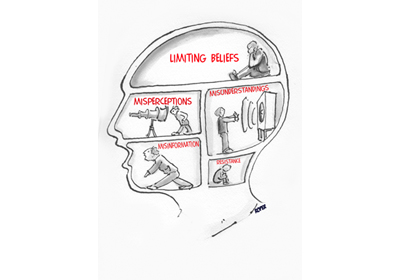It’s easy to blame external circumstances when you get stopped – your manager, lack of time, a change in the market… But if anything really stops you short in life, it’s likely to be a self-limiting belief: a thought about yourself, reinforced by emotion. An event occurred. You drew a conclusion about it and absorbed it emotionally. This is because people are ‘meaning-making’ machines; we try to give meaning to everything!
We all have our own rich personal history of events – from parents, educators, our culture, gender and work experience – and, as a result, we’ve developed our own unique perspectives on the world and ourselves. Before long, we’re on autopilot, with these now-subconscious beliefs guiding our actions in life. Many of these beliefs help sustain us, but others don’t – they limit our ability to lead a happy and fulfilling life.
What about at work?
In working life, our self-limiting beliefs affect whether we are successful and the organisation we work in is a satisfying place to be. Here are some common self-limiting beliefs:
- You can’t trust anybody.
- Hard work is noble.
- Fulfilling work is for others, not me.
- Fulfilment comes from my personal life, not my work life.
- I’m too old to make major changes to the way I work.
- My family and friends will think I’m crazy.
- I’m a fraud – my success is a result of the corporate structure.
- The unknown isn’t safe.
- I’m afraid of failing.
- It’s a dog-eat-dog world.
Your beliefs stay with you for three primary reasons:
First, you label them. (“I’m no good at business finance. Nobody in my family can do maths.”) Labelling beliefs and focusing on where they come from helps you rationalise them and make them okay.
Then you engage in selective data gathering. You seek out evidence to support your beliefs and ignore evidence that would support the opposite belief. (“I made a mess of the budget presentation – everyone else was so confident.”)
Finally, you disguise them – sugar-coat them – to make them more palatable. They become an ego advantage. For example, “I’m not good at finance…” can become “I’m just the intellectual type” – a more empowering belief (for you) which could aid, but is actually more likely to limit your career.
By holding these beliefs you limit what is possible in your own performance. At work, and especially if you are in a senior position, you ultimately limit what the organisation is capable of achieving. If you manage other people, you may tend to buy into their self-limiting beliefs; where you are in the grip of a disempowering belief about yourself, you are unlikely to be the kind of coach who will inspire others to go beyond their own limitations.
But aren’t we stuck with our beliefs?
Beliefs can be changed. While they feel very real to the believer, they are not absolute – they are learned. When you have a genuine willingness to replace a belief with something new and empowering, it is entirely possible to do just that.
Throughout your lifetime, your beliefs change continually. Beliefs that you once thought to be immutable cease to be true. Take the example of Roger Bannister who, in 1957, became the first athlete to break the four-minute barrier for running a mile. Before this, it was conventional wisdom that a sub-four-minute mile was impossible. But that same year, sixteen other athletes also ran a mile in less than four minutes. They didn’t become superhuman overnight – their beliefs changed!
Like those milers, business people have their own unique sets of beliefs, some of which limit their potential. For instance, during a recession, the members of a sales force may all believe that strong sales are impossible. But if just one person increases their sales, what seemed an inevitable fact will suddenly appear more like a thin excuse for poor performance.
Create a ‘can do’ culture
The organisation that can overcome self-limiting beliefs in the minds of its workforce – including its leaders – will be the organisation that wins in the future. This is why, in our organisation development work, we start by looking in depth at the fundamental beliefs and values of the organisation’s leaders.
You need to create an organisation culture in which the ‘can do – will do’ mentality thrives and becomes the norm. In this type of culture, success and achievement are expected and much more likely to happen – and you can only create a culture like this if you have tackled and conquered your own personal self-limiting beliefs.

Thank you Kate for this excellent article. Breaking through our self-imposed limitations is a journey that requires courage, persistence, and self-awareness. It’s like exploring uncharted territory, where every step forward leads to a deeper understanding of who we are and our capabilities. One common scenario of a limiting belief is the fear of failure, which can hold us back from pursuing our dreams and taking risks. But when we challenge this belief and embrace the possibility of failure as a natural part of growth, we open ourselves up to new opportunities and experiences that can transform our lives. I love to share this phrase, the only limits we have are the ones we impose on ourselves. Let’s break free.
Thank you, Rye. It certainly does take courage and self-awareness, and is not always easy, but it’s so worth it in the end.